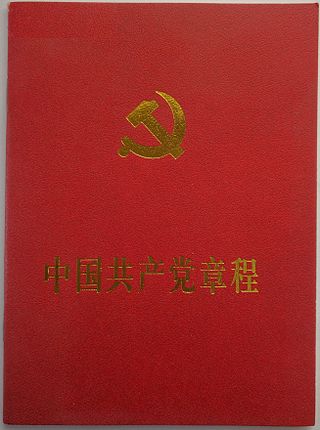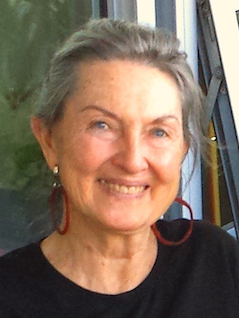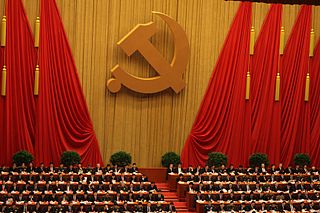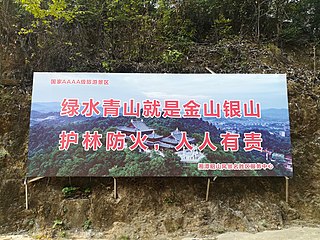Related Research Articles

The Chinese Communist Party (CCP), officially the Communist Party of China (CPC), is the founding and sole ruling party of the People's Republic of China (PRC). Under the leadership of Mao Zedong, the CCP emerged victorious in the Chinese Civil War against the Kuomintang. In 1949, Mao proclaimed the establishment of the People's Republic of China. Since then, the CCP has governed China and has had sole control over the People's Liberation Army (PLA). Successive leaders of the CCP have added their own theories to the party's constitution, which outlines the party's ideology, collectively referred to as socialism with Chinese characteristics. As of 2023, the CCP has more than 98 million members, making it the second largest political party by membership in the world after India's Bharatiya Janata Party.
Process philosophy, also ontology of becoming, or processism, is an approach in philosophy that identifies processes, changes, or shifting relationships as the only real experience of everyday living. In opposition to the classical view of change as illusory or accidental, process philosophy posits transient occasions of change or becoming as the only fundamental things of the ordinary everyday real world.

Murray Bookchin was an American social theorist, author, orator, historian, and political philosopher. Influenced by G. W. F. Hegel, Karl Marx, and Peter Kropotkin, he was a pioneer in the environmental movement. Bookchin formulated and developed the theory of social ecology and urban planning within anarchist, libertarian socialist, and ecological thought. He was the author of two dozen books covering topics in politics, philosophy, history, urban affairs, and social ecology. Among the most important were Our Synthetic Environment (1962), Post-Scarcity Anarchism (1971), The Ecology of Freedom (1982), and Urbanization Without Cities (1987). In the late 1990s, he became disenchanted with what he saw as an increasingly apolitical "lifestylism" of the contemporary anarchist movement, stopped referring to himself as an anarchist, and founded his own libertarian socialist ideology called "communalism", which seeks to reconcile and expand Marxist, syndicalist, and anarchist thought.

The Constitution of the Chinese Communist Party has 55 articles and its contents describe the program of the party, as well as its organizational structure and party symbolism.

John Boswell Cobb Jr. is an American theologian, philosopher, and environmentalist. He is often regarded as the preeminent scholar in the field of process philosophy and process theology, the school of thought associated with the philosophy of Alfred North Whitehead. Cobb is the author of more than fifty books. In 2014, Cobb was elected to the prestigious American Academy of Arts and Sciences.
Pan Yue is a Chinese government official who is the current minister of the National Ethnic Affairs Commission and a deputy head of the United Front Work Department.

Ariel Salleh is an Australian sociologist who writes on humanity-nature relations, political ecology, social change movements, and ecofeminism.

The 18th National Congress of the Chinese Communist Party was held November 8-15, 2012 at the Great Hall of the People. It was preceded by the 17th National Congress of the Chinese Communist Party. Due to term limits and age restrictions, seven of the nine members of the powerful Politburo Standing Committee (PSC) retired during the Congress, including Hu Jintao, who was replaced by Xi Jinping as General Secretary of the Chinese Communist Party. The Congress elected the 18th Central Committee of the Chinese Communist Party, and saw the number of Politburo Standing Committee seats reduced from nine to seven. It was succeeded by the 19th National Congress of the Chinese Communist Party.
The Beijing Consensus or China Model, also known as the Chinese Economic Model, is the political and economic policies of the People's Republic of China (PRC) that began to be instituted by Deng Xiaoping after Mao Zedong's death in 1976. The policies are thought to have contributed to China's "economic miracle" and eightfold growth in gross national product over two decades. In 2004, the phrase "Beijing Consensus" was coined by Joshua Cooper Ramo to frame China's economic development model as an alternative—especially for developing countries—to the Washington Consensus of market-friendly policies promoted by the IMF, World Bank, and U.S. Treasury. In 2016, Ramo explained that the Beijing Consensus shows not that "every nation will follow China’s development model, but that it legitimizes the notion of particularity as opposed to the universality of a Washington model".

Arran Emrys Gare is an Australian philosopher known mainly for his work in environmental philosophy, philosophy of science, philosophy of culture and the metaphysics of process philosophy. He currently holds the position of Associate Professor in the Faculty of Life and Social Sciences at Swinburne University of Technology in Melbourne, Australia.

The Chinese Dream, also called the China Dream, is a term closely associated with Xi Jinping, the General Secretary of the Chinese Communist Party (CCP) and China's paramount leader. Xi began promoting the phrase as a slogan during a high-profile tour of an exhibit at the National Museum of China in November 2012, shortly after he became leader of the CCP. The exhibit at that time was called the "Road to National Rejuvenation". Xi said that the Chinese Dream is the "great rejuvenation of the Chinese nation".

Eco-socialism is an ideology merging aspects of socialism with that of green politics, ecology and alter-globalization or anti-globalization. Eco-socialists generally believe that the expansion of the capitalist system is the cause of social exclusion, poverty, war and environmental degradation through globalization and imperialism, under the supervision of repressive states and transnational structures.
Socialism with Chinese characteristics is a set of political theories and policies of the Chinese Communist Party (CCP) that are seen by their proponents as representing Marxism–Leninism adapted to Chinese circumstances and specific time periods, consisting of Deng Xiaoping Theory, Three Represents, Scientific Outlook on Development, and Xi Jinping Thought. According to CCP doctrine, Xi Jinping Thought is considered to represent Marxist–Leninist policies suited for China's present condition while Deng Xiaoping Theory was considered relevant for the period when it was formulated.
The Chinese Communist Party (CCP) frames its ideology as Marxism adapted to the historical context of China, often expressing it as socialism with Chinese characteristics. Major ideological contributions of the CCP's leadership are viewed as "Thought" or "Theory," with "Thought" carrying greater weight. Influential concepts include Mao Zedong Thought, Deng Xiaoping Theory, and Xi Jinping Thought. Other important concepts include the socialist market economy, Jiang Zemin's idea of the Three Represents, and Hu Jintao's Scientific Outlook on Development.
"Four Confidences" is a political concept by Chinese Communist Party (CCP) general secretary Xi Jinping. The concept includes "Confidence in Path, Confidence in Theories, Confidence in System, and Confidence in Culture."

Xi Jinping Thought on Socialism with Chinese Characteristics for a New Era, commonly abbreviated outside China as Xi Jinping Thought, is an ideological doctrine created during General Secretary Xi Jinping's leadership of the Chinese Communist Party (CCP) that combines Chinese Marxism and national rejuvenation. According to the CCP, Xi Jinping Thought "builds on and further enriches" previous party ideologies and has also been called as the "Marxism of contemporary China and of the 21st century". The theory's main elements are summarized in the ten affirmations, the fourteen commitments, and the thirteen areas of achievements.

Clear waters and green mountains, alternatively green mountains are gold mountains or two mountain theory, refers to a political slogan on environmental policy formulated by Chinese Communist Party (CCP) general secretary Xi Jinping. The full slogan is "clear waters and green mountains are as valuable as gold and silver mountains".

The 20th National Congress of the Chinese Communist Party (CCP), commonly referred to as Èrshí Dà, was held in the Great Hall of the People, Beijing from 16 to 22 October 2022. The National Congress is the highest organ of the party, and is stipulated to be held every five years. The conference had 2,296 delegates and 83 specially invited delegates.

Environmentalism in China consists of philosophical concepts and the movement within China with the goals of preserving its environment and addressing environmental issues.

Whole-process people's democracy, formerly termed whole-process democracy, is a Chinese Communist Party (CCP) political concept describing the people's participation in, and relationship to, governance under socialism with Chinese characteristics. Whole-process people's democracy differs from liberal democracy in that it is a consequentialist model of political decision-making, aiming to be judged by how well the government is able to improve the socioeconomic lives of citizens, rather than being based on democratic processes.
References
- 1 2 3 4 5 6 Zhihe Wang, Huili He, and Meijun Fan, "The Ecological Civilization Debate in China: The Role of Ecological Marxism and Constructive Postmodernism—Beyond the Predicament of Legislation", last modified 2014, Monthly Review , accessed November 1, 2016.
- 1 2 Zhang Chun, "China's New Blueprint for an 'Ecological Civilization'", last modified September 30, 2015, The Diplomat , accessed November 1, 2016. Archived March 1, 2020, at the Wayback Machine
- 1 2 James Oswald, "China turns to ecology in search of ‘civilisation’", last modified August 3, 2016, Asian Studies Association of Australia, accessed November 1, 2016.
- ↑ Zhu Guangyao, "Ecological Civilization: A national strategy for innovative, concerted, green, open and inclusive development" Archived 2019-05-09 at the Wayback Machine , last modified March 2016, United Nations Environment Programme , accessed November 1, 2016.
- ↑ Francis, Pope. Laudato Si': On Care for Our Common Home. p. Ch 4, #139.
- 1 2 3 4 Curtis, Simon; Klaus, Ian (2024). The Belt and Road City: Geopolitics, Urbanization, and China's Search for a New International Order. New Haven and London: Yale University Press. doi:10.2307/jj.11589102. ISBN 9780300266900. JSTOR jj.11589102.
- 1 2 Arran Gare, "Barbarity, Civilization and Decadence: Meeting the Challenge of Creating an Ecological Civilization" Archived 2016-11-04 at the Wayback Machine , in Chromatikon V: Yearbook of Philosophy in Process, ed. Michel Weber and Ronny Desmet (Louvain-la-Neuve: Presses universitaires de Louvain, 2009): 167.[ dead link ]
- ↑ Jiahua Pan, China's Environmental Governing and Ecological Civilization (Heidelberg: Springer-Verlag GmbH, 2016), 35.
- 1 2 3 4 5 6 Harrell, Stevan (2023). An Ecological History of Modern China. Seattle: University of Washington Press. ISBN 9780295751719. JSTOR jj.8362580.
- ↑ Jiahua Pan, China's Environmental Governing and Ecological Civilization (Heidelberg: Springer-Verlag GmbH, 2016), 34.
- ↑ Cobb, Jr., John B.; Scwhartz, Wm. Andrew (2018). Putting Philosophy to Work: Toward an Ecological Civilization. Minnesota: Process Century Press. ISBN 978-1940447339.
- ↑ John B. Cobb, Jr., "Constructive Postmodernism" Archived 2013-08-08 at the Wayback Machine , 2002, Religion Online, accessed November 1, 2016. See David Ray Griffin, William A. Beardslee, and Joe Holland, Varieties of Postmodern Theology (Albany, State University of New York Press, 1989)
- ↑ Arran Gare: "The Philosophical Foundations of Ecological Civilization: A Manifesto for the Future" (Routledge, 2016)[ dead link ]
- ↑ John B. Fullerton, "China: Ecological Civilization Rising?", last modified May 2, 2015, Huffington Post , accessed November 1, 2016.
- 1 2 Abramson, Daniel Benjamin (2020). "Eco-Developmentalism in China's Chengdu Plain". In Esarey, Ashley; Haddad, Mary Alice; Lewis, Joanna I.; Harrell, Stevan (eds.). Greening East Asia: The Rise of the Eco-Developmental State. Seattle: University of Washington Press. ISBN 978-0-295-74791-0. JSTOR j.ctv19rs1b2.
- ↑ Herman Greene, "Re-Imagining Civilization as Ecological: Report on the 'Seizing an Alternative: Toward an Ecological Civilization' Conference", last modified August 24, 2015, Center for Ecozoic Societies, accessed November 1, 2016.
- ↑ "CONFERENCE LIST". postmodernchina.org. Archived from the original on 2019-12-24. Retrieved 2019-12-24.
- ↑ Philip Clayton and Wm. Andrew Schwartz (2019). What is Ecological Civilization?: Crisis, Hope, and the Future of the Planet. Anoka, Minnesota. ISBN 978-1-940447-41-4. OCLC 1112736444.
{{cite book}}: CS1 maint: location missing publisher (link) - ↑ "Spotlight: Organic Marxism, China's ecological civilization drive in spotlight at int'l conference", last modified May 1, 2016, Xinhua News Agency , accessed November 1, 2016. See Philip Clayton and Justin Heinzekehr, Organic Marxism: An Alternative to Capitalism and Ecological Catastrophe (Claremont: Process Century Press, 2014).
- ↑ Philip Clayton and Justin Heinzekehr, Organic Marxism: An Alternative to Capitalism and Ecological Catastrophe, trans. Xian Meng, Guifeng Yu, and Lixia Zhang (Beijing: The People's Press, 2015).
- ↑ Rodenbiker, Jesse (2023). Ecological States: Politics of Science and Nature in Urbanizing China. Environments of East Asia. Ithaca, NY: Cornell University Press. ISBN 978-1-5017-6900-9.